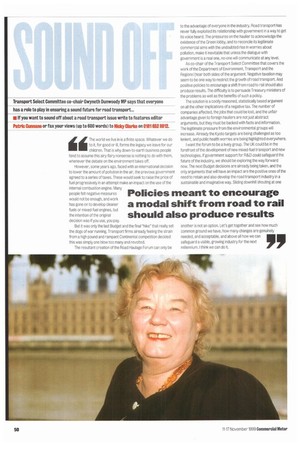Transport Select Committee co-chair Gwyneth Dunwoody MP says that everyone
Page 52

If you've noticed an error in this article please click here to report it so we can fix it.
has a role to play in ensuring a sound future for road transport...
• If you want to sound off about a road transport issue write to features editor Patric Cuomo or fax your views (up to 600 words) to Picky Clarke on 0181 852 8012.
i tToheit world,forgowoed loivrei liinfiosramfisntithee slepgaaccey. Ww ehaleteavveeriowreoduor
children. That is why down-to-earth business people tend to assume this airy-fairy nonsense is nothing to do with them, whenever the debate on the environment takes off, However, some years ago, faced with an international decision to lower the amount of pollution in the air, the previous government agreed to a series of taxes. These would seek to raise the price of fuel progressively in an attempt make an impact an the use of the internal combustion engine. Many people felt negative measures would not be enough, and work has gone on to develop cleaner fuels or mixed-fuel engines, but the intention of the original decision was if you use, you pay.
But it was only the last Budget and the final 'hike" that really set the dogs of war running. Transport firms already feeling the strain from a high pound and rampant Continental competition decided this was simply one blow too many and revolted.
The resultant creation of the Road Haulage Forum can only be to the advantage of everyone in the industry. Road transport has never fully exploited its relationship with government in a way to get its voice heard. The pressures an the haulier to acknowledge the existence of the Green lobby, and to reconcile its legitimate commercial aims with the undoubted rise in worries about pollution, make it inevitable that unless the dialogue with government is a real one, no-one will communicate at any level.
As co-chair of the Transport Select Committee that covers the work of the Department of Environment, Transport and the Regions Ihear both sides of the argument. Negative taxation may seem to be one way to restrict the growth of road transport. And positive policies to encourage a shift from road to rail should also produce results. The difficulty is to persuade Treasury ministers of the problems as well as the benefits of such a policy.
The solution is a coolly reasoned, statistically based argument on all the other implications of a negative tax. The number of companies affected, the jobs that could be lost, and the unfair advantage given to foreign hauliers are not just abstract arguments, but they must be backed with facts and information. The legitimate pressure from the environmental groups will increase. Already the Kyoto targets are being challenged as too lenient, and public health worries are being highlighted everywhere.
want the forum to be a lively group. The UK could be in the forefront of the development of new mixed-fuel transport and new technologies. If government support for R&D could safeguard the future of the industry, we should be exploring the way forward now. The next Budget decisions are already being taken, and the only arguments that will have an impact are the positive ones of the need to retain and also develop the road transport industry in a sustainable and imaginative way. Sliding downhill shouting at one another is not an option. Let's get together and see how much common ground we have, how many changes are genuinely needed, and acceptable, and above all how we can safeguard a viable, growing industry for the next millennium. I think we can do it.












































































































